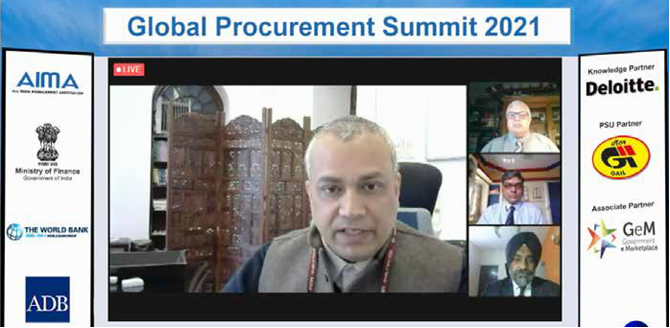Can PPP help cash-starved governments in boosting infrastructure?
Global Procurement Summit 2021 organized by All India Management Association with support of Ministry of Finance, Government of India, the World Bank and the Asian Development Bank gave platform for discussion and exchange of ideas between senior officials engaged in public procurement at central and state public entities and the key bidding communities represented by manufacturers, suppliers, contractors and consultants. The key objective of the summit was to discuss Procurement as Enabler for COVID 19 Emergency response and come out with recommendations for the way forward.
One of the plenary sessions of the summit on “Can PPP help cash- starved governments in boosting infrastructure?” chaired by Mr. Baldeo Purushartha, Joint Secretary (Infrastructure Policy and Finance), Department of Economic Affairs, Ministry of Finance, Government of India. The speakers for this session included Mr. Maurice Diamond, PPP Expert, IPATS London, Mr. Vikash Sharda, Partner, Infranomics Consulting LLP and Mr. Amandeep Singh Virk, PPP Expert.
Mr. Purushartha started the session by establishing the importance of infrastructure development for growth of the country in a sustained manner. He emphasized on the need of an investment of around USD 1.4 trillion over the next five years on infrastructure to accomplish a GDP of USD 5 trillion and elaborated on the importance of PPPs in fulfilling the investment requirements. He was pleased to report India’s ranking among other country in the world in terms of readiness, operational maturity and having an ideal environment for executing high- valued PPP programs.
Mr. Purushartha further elaborated on the measures taken by the Government of India for encouraging investments in the Infrastructure Sector through announcement of National Infrastructure Pipeline (NIP). He mentioned that Government of India is making attempts for increasing the share of NIP projects to be executed in PPP mode from around 20% to nearly 40%. He also indicated that the Government of India has revamped its Viability Gap Funding (VGF) scheme for providing enhanced support of upto 60-80% of the Capex and in some case upto 50% of the Opex for first five years after Commercial Operations Date (COD) to encourage private sector participation in development of social infrastructure (Health, Education, Waste Water, Solid Waste Management, Water Supply, etc.).

Mr Baldeo Purushartha, Joint Secretary (Infrastructure Policy & Finance), DEA, Ministry of Finance, Government of India; Mr Maurice Diamond, PPP Expert, IPATS, London; Mr Vikash Kumar Sharda, Partner, Infranomics Consulting LLP and Mr mandeep Singh Virk, PPP Expert, India
Followed by the chairperson, the next speaker, Mr. Maurice Diamond, presented his views on the key factors that should be considered for executing a successful PPP endeavor. He elaborated on the notion of cash strapped governments and explained that a cash strapped government does not necessarily mean lack of budgetary availability rather it can also be due to absence of enabling legislation, streamlined procurement process and decision making. He emphasized on the challenge that various Government face in striking a balance between speed of getting money into economy and meeting sustainability objectives and balancing the long-term economic benefits of infrastructure investment with immediate need to spend on healthcare, employee and business support. In closing remarks, Mr. Maurice stressed on the importance of having a clear understanding about PPP at the planning stage itself and defining sustainable long-term goals for driving a successful PPP programme.
The next speaker of the session, Mr. Vikash Sharda talked about evolution of PPP in Transport and Water Sector in India. The presentation encapsulated the evolution of PPP in these sectors, its performance, major impediments in its success and suggestions for improving the PPP landscape in the country. While reflecting on the advancements of PPP in Transport sector, Mr. Vikash highlighted that adoption of PPPs in State Highways continue to remain low due to creditworthiness issue of counterparty, fiscal health of some states and lack of PPP capacity at authority level. He also mentioned that speculations made in traffic projections, delays in appointment of Independent Engineers and challenges in post award contract management of PPP projects are some of the key issues that limit greater participation of private sector.
Mr. Vikash stressed on the need to enable long term funding for private sector (including tax benefits for secondary market transactions) and better project preparedness for boosting private sector investment in development of transport related infrastructure in the country. He further mentioned that developing an effective communication & risk management strategy and creating an enabling policy environment by establishing a clearly defined tariff and metering policy prior in the bidding process would be beneficial in effective implementation of PPP in Water Projects.
The first session of the second day ended with a presentation from the last speaker for the session, Mr. Amandeep Singh Virk, sharing his enriched experience of executing PPP projects in Africa. He also shared his views on how PPP can help low income countries and some misconceptions and interventions that should be handled with care for successful implementation of a PPP programme. In his presentation, Mr. Amandeep mentioned various advantages of PPP which included providing financial flexibility, no need for short term budgetary resource allocation, transparency and accountability, transfer of risk, etc. He also raised a very crucial point that failure of implementing PPPs in a certain region (which may be due to in-adequate preparation during the planning stage), pertains a high risk of losing market’s trust for investing in any such future model.
Mr. Amandeep also shared some recommendations on what a cash strapped country do for successful implementation of PPPs. These included interventions like roping in Multilateral Development Banks and commencing implementation of small/ medium size pilot projects for achieving initial success rather than executing an ill-prepared high valued programme that would result in failure. In conclusion, Mr. Amandeep stated that good governance is critical factor for success of PPPs.
Finally, some queries raised by attendees were answered by Mr. Baldeo Purushartha, Joint Secretary (Infrastructure Policy and Finance), Department of Economic Affairs, Ministry of Finance, Government of India along with other panelist.
